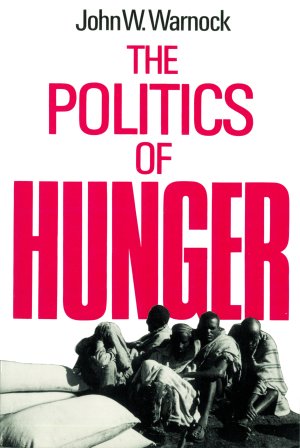Politics of Hunger : The Global Food System | The Gross Inequalities in the Production and Distribution of Food | The Persistence of Neocolonialism
by John W. Warnock
London, New York and Toronto: Methuen, 1987. 
ISBN: 0-458-80630-7 paperback 334 pp.
During the 1980s the world was once again reminded that hunger had not been abolished. The major focus has been on the low-income countries in Africa. However, food riots elsewhere revealed the growth of hunger in countries with relatively high per capita income and economic growth rates. The Great Recession of the 1980s and the conservative policies of many governments have led to an increase in poverty and hunger in many of the most advanced industrialized countries.
This important and provocative book explains the persistence of hunger, poverty, and the lack of balanced development in many countries and the central role of agriculture in economic development. Most theories of agricultural development are based on the experiences of western Europe and the United States while the two models for successful "late development" have been Japan and the Soviet Union. In this book John W. Warnock surveys the evolution of agriculture under colonialism in Latin America, Africa, and Asia and concludes that this long period of external domination distorted the development prospects for these areas and retarded the production of food.
Under strong state capitalist governments, a a few underdeveloped countries have broken tthe colonial patterns of development. China and Cuba have succeeded in abolishing hunger and have greatly reduced poverty and inequality. However, other post-revolutionary societies are having far less success because of economic blockades and outside military intervention.
While the primary focus of the book is on the short-run problems of inequality, the author examines the long-run ecological and resource constraints to a sustainable food system and raising the standard of living in the underdeveloped world.
Dedicated to the memory of John Wilson Warnock and his family and the other victiims of the Great Famine who fled Ireland for the New World, and of those who were not so fortunate.
From the author's preface:
The approach I have used in this work is that of political economy, commonly identified as interdisciplinary social science. Scientific political economy originated with Adam Smith and David Ricardo. However, in the 19th century, following industrial capitalism's rise to power in Great Britain, political economy degenerated into apologetics, rationalizing and defending the existing order of gross inequality. In this form it was harshly criticized by many on the political left, including Marx and Engels. More recently, political economy has become associated with radical social science as it once again addresses the question of the accumulation of capital; the role of labour in production; the class, gender, and racial divisions in society; the role of the government and political movements; and imperialism.
In contrast to orthodox economics and social science in general, political economy recognizes the evolution of societies and the historic specificity of theories like "free trade." In dealing with complex issues like hunger and development, it is also necessary to be familiar with basic scientific and ecological concepts. Marx and Engels revived that tradition, now incorporated into the new political economy.
JOHN W. WARNOCK has had a varied background as a government employeee in the area of international relations, a commercial fruit grower, and consultant on food and agricultural issues. Dr. Warnock has taught political economy at several Canadian universities and has published extensively. In addition, he has been an active participant in political affairs, human rights organizations, farm organizations, and environmental groups associated with Friends of the Earth.
Table of Contents:
1 The Persistence of Hunger
2 Ideological Approaches to World Hunger
3 Agriculture and Economic Development
4 Agriculture and Late Development: Latin America and Africa
5 The European Impact on Asia
6 The Industrial Food System
7 The Unequal Distribution of Population and Foodlands
8 The Loss of Foodland Resources
9 How Much Food Can the World Produce?
10 Developing Food and Agriculture under Capitalism
11 Alternatives for Underdeveloped Countries
12 Summary and Conclusion
NOTE: This book is out of print but available through amazon.ca and other used book services.
 I continue to put out new articles and material that you can find on my blog at blogspot.
I continue to put out new articles and material that you can find on my blog at blogspot.
